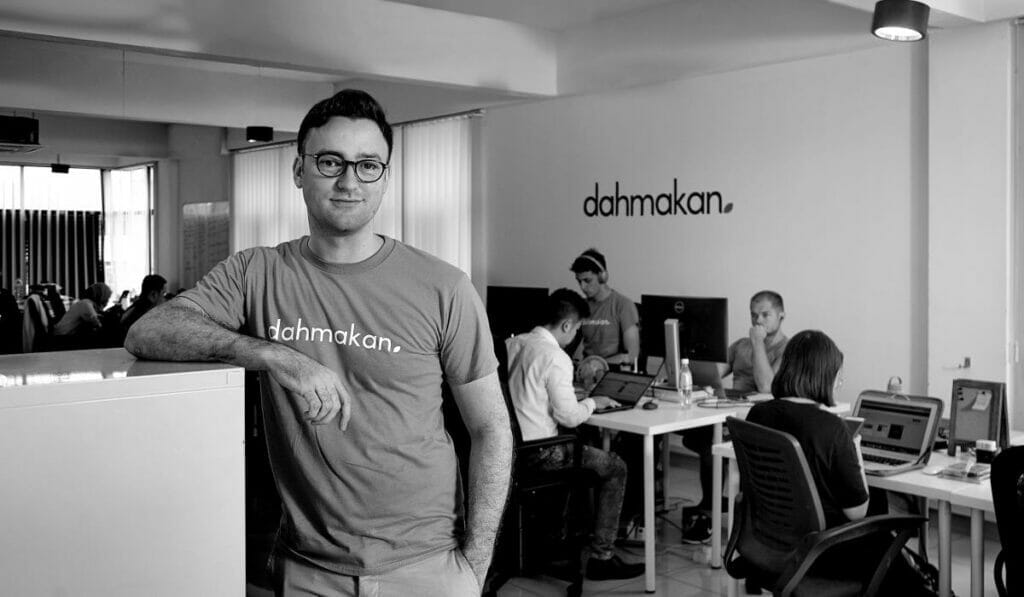Tell us about yourself and your experience in the food industry both internationally, with your experience in Foodpanda in Hong Kong, and here in Malaysia.
I started with very limited experience in the F&B industry until Foodpanda, where I was the first guy on the ground to roll it out in Hong Kong. I was involved in everything and that’s where we saw the huge demand for convenient food delivery in South-East Asia and Asia. There’s a big market that’s currently untapped, the daily takeout market, and food delivery so far hasn’t been able to cater to it due to the structure of traditional food delivery.
With dahmakan, I saw that Malaysia is a very interesting country, where people love food and, at the same time, are very curious to try out new things. It’s much more dynamic in comparison to Germany, where I’m originally from, where people are more sceptical. To us, Malaysia is a great starting ground to build a South-East Asian brand and so we jumped right in.
dahmakan is a relatively young company, having been founded in 2015. Tell us more about the company.
There are three co-founders and, when we first started, we did everything ourselves, from buying ingredients to building the website. Now, we are 100 strong, operating in Kuala Lumpur and, more recently, Bangkok. Our customers drove us to where we are now and we built a team according to where we can add the most value for them, including being vertically integrated to have everything in-house.
Culture-wise, we try to get the best people involved, those who are fundamentally excited about what we do, about food, who want to create and leave a mark in the world. Then, we empower them and give them resources to execute their ideas. The team is incredibly diverse, nationalitywise, but it’s also a mix of young people and experienced team members, like chefs with 25 years of experience.
It would seem the food delivery market is saturated but dahmakan sets itself apart by having its own in-house culinary team and a well-thought out menu. How did you and your team come to take this route?
We always try to think from the customer’s point of view, making the service better, faster, more convenient, more affordable, tastier and of higher quality. On the way, we looked at how we could outsource certain parts, like delivery, but we quickly realised if we wanted to provide the most value, we have to be able to do it ourselves, because we can do it much more efficiently and provide a better experience in-house.
What else sets dahmakan apart from the competition?
Well, we see that we can fundamentally change the way people eat by making high-quality foods affordable and super convenient. Our approach, we believe, is the path to achieve that, so we are focused on that. We don’t think too much about competitors or other companies; we think from the customer’s point of view and how we can make ourselves better for them.
How do you approach running a start-up? Especially for dahmakan with a relatively small team, how do you keep things moving smoothly?
In a start-up, everything moves very fast. We have doubled our headcount in the last 12 months and we are looking to triple that number in the next 12 months. The challenge is to make sure everyone stays on point with where we want to go, what our vision is, what the goals are and to foster team communication. We have only been around for the past three years and it’s growing so fast that you have to always evolve, so that everybody can keep up and stay empowered.
What is the one strength that you and the team at dahmakan have that has led to the success of the company?
Mainly, it is focusing on the customer experience, which is reflected in the way we approach and prioritise our challenges. We always try to first solve problems which have the biggest impact on our customers. On a whole, it really is a culmination of all the points we’ve talked before.
What are some of the challenges you faced in creating dahmakan and some that you foresee in the near future?
Start-ups are full of challenges, first of which is building a team of the right people and securing funding. Then, for us as founders and first-time managers, to develop as fast as the company, which is personally one of the biggest challenges.
In terms of future challenges, it is continuing to be fast and agile. I find many companies slow down as they mature. To avoid that, there are certain steps we’ve started to implement, like developing many smaller teams to handle projects, so that we can focus on more things at once, as opposed to having one big structure.
Finally, what can we expect from you and dahmakan in the future?
We just launched a line of more affordable meals that start at MYR14, which makes us the only company with such an offering. On the flipside, we want to offer more premium dishes to those who want to spend more on selective and higher-quality meals. In general, we’re looking to double the variety we offer, while also looking to be more available to meet high demand. Long-term, we want to eventually be more affordable than what you can cook at home, while still offering food made by experienced chefs.
As a company, in the next 12 months we are looking to expand into three other cities and truly bring this further across Asia and East Asia in the next couple of years.
PHOTOGRAPHY ROBIN LIEWÂ



